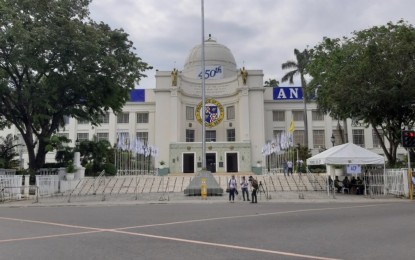
The Cebu Provincial Capitol. (PNA file photo by John Rey Saavedra)
CEBU CITY – Hospitals run by the Cebu provincial government will soon have better laboratory infrastructure to provide better medical services to the public.
This, after the Capitol signed a five-year joint venture agreement (JVA) with diagnostics and laboratory clinic Prime Care Cebu (PCC) for the development, implementation, and modernization of laboratories of the four provincial and 12 district hospitals in the province through the Laboratory Equipment and Reagent Outfitting Program (LEROP).
“This will improve the services sa atong (in our) hospitals,” Garcia said in a press statement on Tuesday, a day after the joint venture signing with top Prime Care officials and Provincial Board members at the Capitol.
Under the agreement, PCC will provide state-of-the-art laboratory equipment, laboratory supplies, and reagents to all the district and provincial hospitals run by the Capitol.
Based on the joint venture deal, “PCC will also provide water filtration systems for the de-ionized water, technological solutions for Laboratory Information System (LIS) and Inventory Tracking System (ITS) at no cost to the province.”
For his part, PCC president Dr. James Peter Aznar assured that the needed diagnostic equipment are expected to be installed in the hospitals within 60 days.
The diagnostics services provider will invest about PHP58 million to modernize the laboratories of the district and provincial hospitals.
“We target the rollout within 60 days to install everything,” Aznar said.
He noted that their partnership with the provincial government, which is a first of its kind, will help streamline the laboratory services of the hospitals.
He added that it will also make the much-needed laboratory tests more accessible for the patients.
Based on the JVA, PCC will provide a licensed clinical pathologist and provide the following equipment: hematology analyzer (16 units); chemistry analyzer (16 units); deionizing water machine (16 units); electrolyte analyzer (four units); blood stations (four units); coagulation machine (four units); and immunochemistry (four units).
Prime Care will also provide services including routine blood chemistry, special blood chemistry, blood bank, hematology, clinical microscopy, and immune serology.
The hospitals will provide the needed manpower to man the laboratories.
Meanwhile, provincial health officer Christina Giango assured that the current laboratory fees offered by the hospitals will remain unchanged.
PCC will follow the laboratory prices currently used by all district and provincial hospitals prior to the JVA.
“Even if it’s a private-run laboratory, the same charges will be charged to the patients since they are located in district hospitals,” the health official said in Cebuano.
She said the Capitol-managed hospitals follow a provincial ordinance that mandates standardization of laboratory fees.
“What we have to do is to pay for their services, and they are following also our fees,” she said.
Giango noted that laboratory fees of the patients are usually charged to PhilHealth, the Malasakit Center, and other government medical assistance programs.
Besides, government hospitals also follow the no-balance billing for indigent patients as mandated by law, she said. (PNA)
